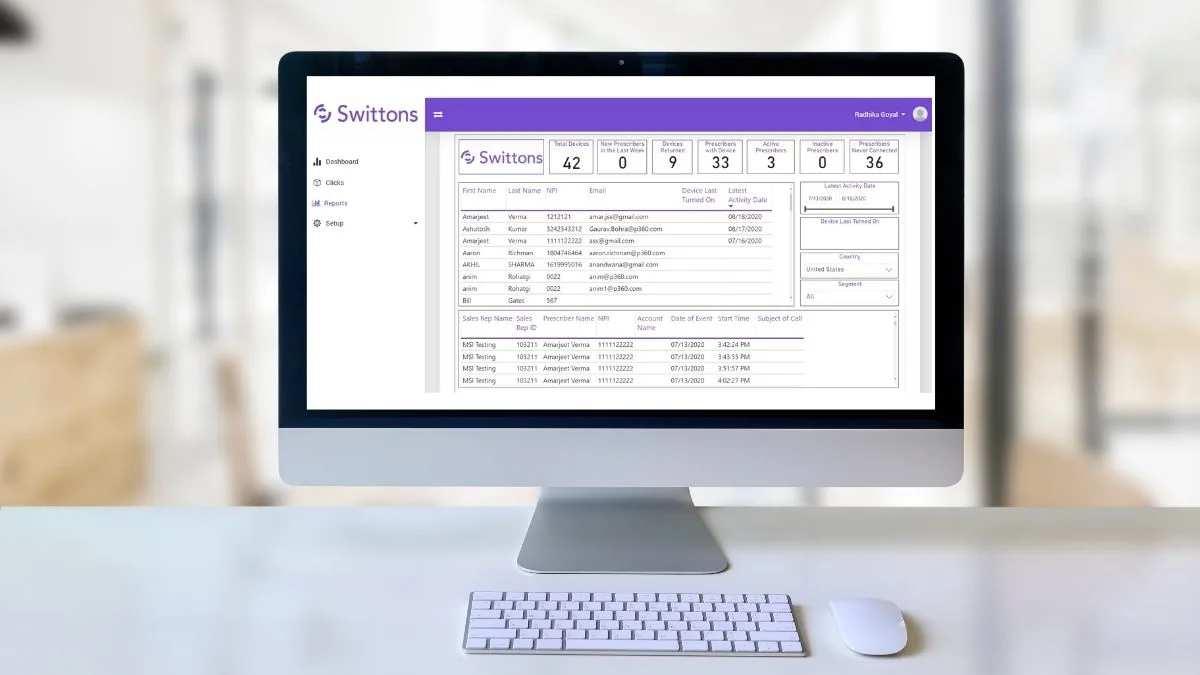Home / Blogs / Legacy Blog /
Technologies Breaking Barriers Between Pharma companies & Stakeholders
We asked contributor Dr. Kenyatta Cosby, MD, to once again provide us with his perspective on an important topic: breaking down barriers between Pharma and key stakeholders with innovative technologies. He is a seasoned and published practitioner, and someone who definitely understands the strategic and operational pursuits of life sciences organizations. We are proud to have Dr. Cosby provide his expert opinion on today’s physician engagement climate and opportunities for breaking down barriers with innovative technologies.
Over the past several months, the pharmaceutical industry has faced new challenges when it comes to the marketing their commercial products because of the ever-changing landscape created by the COVID-19 pandemic. The ability of pharmaceutical sales representatives to disseminate valuable information to end-users like healthcare professionals (HCPs), third-party vendors and patients has been interrupted by the new clinical restrictions and public health regulations found throughout the healthcare sector. In short, pharma reps can no longer be all-things-to-all-people. They must practice new ways of engaging with their professional constituents, especially as outside pressures erode the meeting platforms that served them well for decades.
The good news is that new corporate strategies are being developed to alleviate this problem, and they are being centered around three critical areas of marketing – utilization of services, engagement of end-users, and early analysis of changing commercial trends. While changes across geographical regions and medical specialties vary from state to state, P360 has produced a novel lineup of products, one is called Swittons, which is specifically designed to address the platform changes found in our current healthcare system. Swittons is an Internet of Things (IoT) powered smart device that automate messaging and push/pull data streams in order to accelerate sales operations for pharmaceutical organizations. It is these types of solutions that will ultimately enhance commercial value for big pharma and improve the “work experience” of pharma reps.
Swittons is an innovative technology-based devices which are designed to maximize connectivity, cut-cost, centralize care, and reduce friction when it comes to the delivery of prescription drugs.
Care Providers are at a Crossroads
As medical clinics and hospitals struggle to stay afloat, their operational mission is at a crossroads and now centers on their financial health and providing great medical services to their customers. Today more than ever, they are actively looking for smart devices and other innovations to help streamline operations. This includes a more efficient relationship with pharma.
In a recent report by Mckinsey & Company1, physicians reported an 82% decrease in patient volume since the arrival of COVID-19. This will unfortunately have a major impact on prescription volume for the future, especially considering that the Centers for Disease Control and Prevention (CDC)2 recently recommended stockpiling refills and advised HCPs to shift to 90-day refills.
Additionally, in a recent white paper by KPMG International (Pharma Outlook 2030)3 there was a great review of the pre-COVID-19 industrial pressures, which have only been exacerbated by the current global pandemic. The pharmaceutical sector was already facing a seismic shift in reduced forecast revenues, and relying on the status quo was probably not ideal for most pharmaceutical corporations. Some of the industrial pressures stemmed from rising demands for more efficient healthcare, which directly caused downward pressure on pricing and a new shift on treatment delivery to preventive healthcare models. The industrial success of providing novel therapeutics (i.e., gene therapy and stem cell therapy), advanced technology (i.e., 3D printing, big data analytics and nanotechnology) and personalized medicine (i.e., wearable devices, electronic apps and digital engagement) has been great for the consumer, but has produced a disrupted therapeutic marketplace.

New Service Models for Pharma
In order to stem a collapse of the balance sheet, the pharmaceutical industry has created new service models to maintain future revenues against what is described as a severe financial downturn by 2030. A survey produced by Accenture4, a leading global professional service company with specialized capabilities across more than 40 industries within 120 countries, reported that 87% of HCPs now want meeting to be virtual, or a mixture of virtual and in-person, even after the pandemic ends. And 69% want more education on how to better treat patients remotely, with help on how to manage their conditions at home. HCPs value tools for remote interaction and expect restrictions on the access of healthcare facilities to continue well into the future.
With that in mind, many in the engagement areas in pharmaceutical sales have turned to multichannel delivery of their product message and innovative platforms, such as Swittons to remain competitive. Initially, the digital technology era of late made it possible for the pharma sales force to revolutionize the marketplace with the help of mobile devices (i.e., tablets and cell phones). This allowed engagement, discover, analysis and response through a multichannel process that included approved emails, personalized microsites, remote communication, and self-directed websites.
P360 Answers the Call
Today, P360 has created an expanded lineup of Swittons IoT powered smart devices5 which enables omnichannel workflows (unlike multichannel solutions that operate in silos). This new approach delivers a consistent personalized user experience across all channels to produce a seamless integration between various user groups for sophisticated companies. Given the current COVID-19 business environment, such innovation has allowed direct pharma to physician communication within pharma labs, pharma supply chains and clinical trials. More pharma companies are using digital tools to improve product performance and just recently Swittons has made its debut on the Salesforce AppExchange.
Salesforce customers that have a need for remote, in the field, physical-to-digital workstreams like inventory requests, service orders, inventory updates, job completion notifications, healthcare delivery and other actions can now execute these tasks automatically within existing Salesforce workflows at the push of a button. Each Swittons device can be custom branded and they come out of the box ready – automatically connecting through a Wi-Fi or GSM cellular connection. There is also a new fingerprint model, which adds yet another layer of protection to ensure data security and fidelity in the engagement process.
Anupam Nandwana7, P360 CEO and Founder, states that “The new Swittons package provides an advanced enterprise solution for sophisticated companies with multiplexed needs.” The primary drivers of the Swittons omnichannel enterprise revolution are life sciences digital innovation initiatives, the post-COVID-19 business environment, and increasingly constrictive regulatory matters regarding direct pharma to physician communication.
The original Switton design was mainly focused on pharmaceutical commercial settings, helping to streamline remote engagement by automating requests and triggering communication channels. The expansion into omnichannel enterprise applications has garnered interest (from various major pharmaceutical companies) for the following cross-pharma uses: (1) To improve pharma labs by automating functions with service software (ServiceNow, Saleforce Service Cloud, Microsoft Dynamics) and triggering team messaging (emails and texts) and phone and video calls. (2) To improve pharma supply chains, where Swittons serves as a connecting point to allow for remote communication, instant notifications and restocking of various warehouses (or pharmacy distribution centers) at the click of a button. (3) To improve clinical trials, to enable one-touch requests of drug supply, incidentals, or trigger discussions with clinical stakeholders.

Such pharma use of Swittons will allow technical integration with organization-wide analytics and AI, helping assimilate relevant data to the C-suite. This enables a top-down, multi-tiered workstream of automations to occur within existing enterprise software solutions. The omnichannel approach to software integration will allow for direct, human-to-digital information flow across previously siloed systems. The Swittons platform also features a flexible user portal that includes device usage dashboards and advanced, customizable analytics built on a Microsoft PowerBI foundation.
By now, within the pharma industry, many understand the necessity to deploy pharma reps and medical science liaisons (MSL) who are equipped with the best remote detailing systems. This notion is supported by the growing popularity of engaging customers and HCPs during the current limited face-to-face meetings within our national healthcare system. The professional benefits of Swittons (i.e., strengthening communication, better data gathering on customers’ needs and presenting products in a more flexible fashion) should be enough to encourage pharma executives to expand into the use of omnichannel remote communication devices.
To learn more about the Swittons for pharmaceutical use, simply visit Swittons or go to P360.
Continued Innovation is the Key
Today, the most significant way to safeguard against poor engagement is to rely on innovative solutions that bring about efficient coordination among key pharmaceutical stakeholders. As the measures for lockdowns and social distancing continue to be debated in the public arena, it is probably safe to say that pharma sales reps will be an important part of our transition to technologically innovative solutions following COVID-19 health impact. The silver lining of the latest pandemic is that pharma sales reps will no longer have to knock on as many office doors as they did in their peak era, the 1990’s. Their days, instead, will now be spent opening digital doors and marketing products in the digital marketplace.
Sincerely,
Kenyatta Cosby, MD
ABOUT THE AUTHOR
Dr. Cosby is a contributing freelance medical writer based in Rockville, Maryland, U.S.A. He is a Physician Scientist who received his medical degree from Howard University College of Medicine and research training at the National Heart Lung Blood Institute/National Institutes of Health and Johns Hopkins University School of Medicine. He successfully managed an FDA-approved clinical trial, featured in the New York Times (https://www.nytimes.com/2003/11/03/us/study-finds-that-nitrites-in-the-body-greatly-aid-blood-flow.html) and published the manuscript in the journal, Nature Medicine (https://www.nature.com/articles/nm954). He also writes on many other topics (i.e., Surgery, Diabetes, Oncology, Hematology, Cardiovascular Research, Imaging, Mental Health Disorders, and Cardiology).
Explore More Relevant Articles on P360
- Swittons by P360 makes its debut on the Salesforce AppExchange
- 6 Innovative Use Cases for Swittons IoT Powered Smart Devices
- P360 Introduces Swittons IoT Smart Devices for Life Sciences Enterprises
- How the IoT is Leading the Omnichannel Revolution for Life Sciences Companies
- Enter our “Design Your Own Swittons” and win $250 Amazon Gift Card
Reference
2: https://www.komando.com/news/cdc-coronavirus-stockpile-meds/710502/
7: https://www.linkedin.com/in/anandwana/
8: Lara Wozniak. Pharma Companies Have Improved How They Engage with Healthcare Providers During COVID-19. New Research from the New room Accenture. August 10, 2020.
9: Marta Vila Ramos; Baltasar Lobato Beleiro; Manuel Gonzalez Fernandez; Miguel Gallo Martinez; and Jacobo de Silva Urquijo. Together Beyond COVID-19: A Look at the Future of the Pharmaceutical Industry. Pharmacy Times. 2020-10-16.
10: Roger Van Den Heuvel. Pharma outlook 2030: From evolution to revolution. February 6, 2017.
11: Brian Fitzgerald. Swittons Makes its Debut on the Salesforce AppExchange. www.Swittons.com. November 11, 2020.
12: Kimberly Brue. P360 Introduces Swittons Smart Devices for Life Sciences Enterprises. www.Swittons.com. October 7, 2020.
13: Ortal Cohen, Brian Fox, Nicholas Mills, and Peter Wright. Pharmaceuticals & Medical Products Practice- COVID-19 and commercial pharma: Navigating an uneven recovery. McKinsey & Company. April 2020



